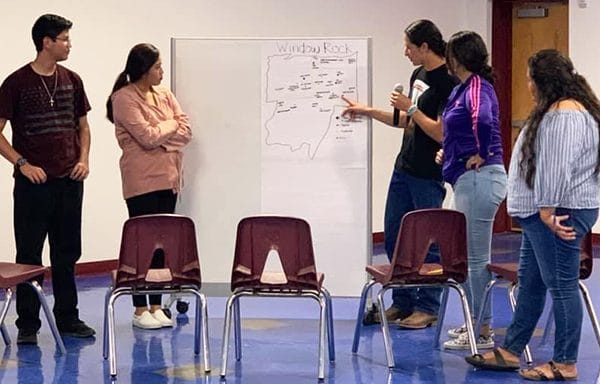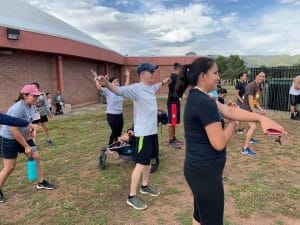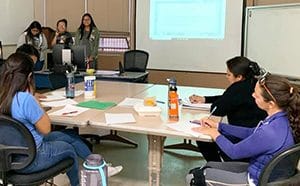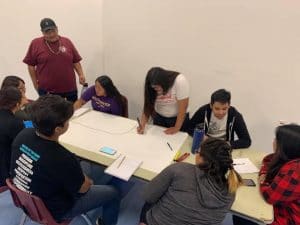
Twenty years ago, Diné College Professor Mark Bauer started a Summer Research Enhancement Program (SREP) to provide Diné students with a hands-on public health research experience in their own hometown communities across the Navajo Nation.
Since that time, Diné College has expanded the successful program, with Heather Dreifuss and Jamie Wilson from Northern Arizona University (NAU) and Carmella Kahn from Diné College joining the SREP team.
 They added resilience as a determinant of health to the SREP curriculum and created a high school component for students in the Navajo Nation interested in health careers, especially public health, at Diné College, titled the Indigenous Summer Enhancement Program (ISEP).
They added resilience as a determinant of health to the SREP curriculum and created a high school component for students in the Navajo Nation interested in health careers, especially public health, at Diné College, titled the Indigenous Summer Enhancement Program (ISEP).
Both the SREP and ISEP programs are grounded in the Diné educational philosophy that places Diné life in harmony with the natural world and the universe. Diné educational philosophy is used to guide students through the research process.
In 2018, under the direction of NAU Professor Nicolette Teufel-Shone, Department of Health Sciences and associate director of the Center for Health Equity Research, NAU added an Indigenous Health track to the Master in Public Health program to develop a graduate path for students, especially those graduating from Dine, to advance their careers in public health.
Over the years, SREP has collaborated with NAU, the University of Arizona and the University of Colorado. Since 2018, SREP has been funded by the Navajo Native American Research Center for Health (Navajo NARCH Partnership), in collaboration with NAU’s Center for Health Equity Research.
Indigenous Summer Enhancement Program
Dreifuss, director of High School Outreach, Research and Education Training with the Navajo NARCH Partnership, leads the ISEP program, which she said “introduces a range of health professions, teaches digital storytelling, develops leadership qualities using an Indigenous framework, and facilitates mentorship between high school students and peer mentors.”
 The one-week high school ISEP program accepts 10-15 students per year and the 10-week SREP program for public health undergraduate students also accepts 10-15 per year. Both programs provide supportive environments for developing strong bi-cultural approaches in public health and health research.
The one-week high school ISEP program accepts 10-15 students per year and the 10-week SREP program for public health undergraduate students also accepts 10-15 per year. Both programs provide supportive environments for developing strong bi-cultural approaches in public health and health research.
“ISEP is based on the successful SREP model and provides American Indian high school students the opportunity to experience a college setting, learn about health professions, and meet local Public Health professionals on the Navajo Nation,” Dreifuss said. “ISEP encourages students to return to the program as peer mentors to take on a leadership role.”
Summer Research Enhancement Program
Kahn, a faculty member at Diné College and University of Arizona; and Wilson, a research associate at NAU, co-lead the SREP program, which provides health-related research training and research experiences.
 Though the SREP program will be virtual this year, students typically participate in three weeks of classroom instruction on the Diné College, Tsaile campus, then attend six-week, hands-on internships with different agencies and mentors, generally located on the Navajo Nation, that provide students with practical experience in data collection and analysis in a health-related program in a community setting.
Though the SREP program will be virtual this year, students typically participate in three weeks of classroom instruction on the Diné College, Tsaile campus, then attend six-week, hands-on internships with different agencies and mentors, generally located on the Navajo Nation, that provide students with practical experience in data collection and analysis in a health-related program in a community setting.
“It’s taken a lot of teamwork and coordination with our entire team to transition to an online program,” Wilson said. “And since SREP 2020 was held virtually last summer and we’ve all had a year of online learning, we feel well-prepared and excited to implement new techniques into our classes. We’re committed to making SREP as interactive as possible for our students.”
In the final week, students usually return to the Tsaile campus to review their experience with their instructors, analyze the data and provide a presentation on their work to not only their peers and faculty but also their internship mentors.
“ISEP and SREP represent an opportunity for American Indian students to explore a career in public health/health sciences by understanding research from a cultural perspective and gaining hands-on experience with the guidance of a mentor,” said Shawndeena George, a student in the NAU Master of Public Health program, who attended SREP in 2018.
“The importance of these programs on the reservation is intuitive, impactful and encouraging, given that I am finishing up my first year in the MPH: Indigenous Health Track program here at NAU thanks to my experience as a SREP alumna,” she added.
NARCH program
According to Teufel-Shone, the goals of the Navajo NARCH Partnership are to develop American Indian/Alaska Native scientists and health professionals and to foster and continue to grow the relationship between Diné College and NAU. She said they also work to enhance the health and wellbeing of the Navajo people through the development of public health training.
Both ISEP and SREP are still accepting applications for this summer. The SREP deadline is March 19 and the ISEP deadline is March 22. For more information, either visit the Diné ISEP page, the SREP page or the CHER NARCH page.